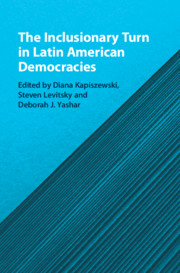Book contents
- The Inclusionary Turn in Latin American Democracies
- The Inclusionary Turn in Latin American Democracies
- Copyright page
- Contents
- Figures
- Tables
- Contributors
- Acknowledgments
- Prologue: Reflections on Two Episodes of Popular Inclusion
- 1 Inequality, Democracy, and the Inclusionary Turn in Latin America
- Part I Extending Social Policy and Participation
- 2 Including Outsiders in Latin America
- 3 Diffusion Dynamics
- 4 Inclusion Without Power?
- 5 Brazil’s Participatory Infrastructure
- Part II Inclusion and Partisan Representation
- Part III New Party–Society Linkages
- Part IV Inclusion, Populism, and Democracy
- References
3 - Diffusion Dynamics
Shaping Social Policy in Latin America’s Inclusionary Turn
from Part I - Extending Social Policy and Participation
Published online by Cambridge University Press: 12 January 2021
- The Inclusionary Turn in Latin American Democracies
- The Inclusionary Turn in Latin American Democracies
- Copyright page
- Contents
- Figures
- Tables
- Contributors
- Acknowledgments
- Prologue: Reflections on Two Episodes of Popular Inclusion
- 1 Inequality, Democracy, and the Inclusionary Turn in Latin America
- Part I Extending Social Policy and Participation
- 2 Including Outsiders in Latin America
- 3 Diffusion Dynamics
- 4 Inclusion Without Power?
- 5 Brazil’s Participatory Infrastructure
- Part II Inclusion and Partisan Representation
- Part III New Party–Society Linkages
- Part IV Inclusion, Populism, and Democracy
- References
Summary
In the last two decades governments across Latin America have adopted and implemented conditional cash transfer (CCT) programs, lifting large numbers of poor families out of economic destitution and inducing child beneficiaries to attend school and receive preventive health care on a regular basis. First emerging in Mexico and Brazil, this social policy innovation was quickly adopted in a wide range of other countries in the region. This chapter employs the analytical framework of diffusion to examine and analyze the spatial and temporal clustering that characterized the spread of CCTs in Latin America. Distinguishing between the adoption of the new policy innovation and its implementation, the chapter argues that diffusion dynamics were crucial in the adoption phase. It leverages a diffusion framework to explain why so many countries adopted CCTs at all. At the same time, the chapter grants that many other factors influenced how CCTs unfolded during the implementation phase, shaping the varied forms they have taken across the region.
Keywords
- Type
- Chapter
- Information
- The Inclusionary Turn in Latin American Democracies , pp. 93 - 116Publisher: Cambridge University PressPrint publication year: 2021
References
- 1
- Cited by

